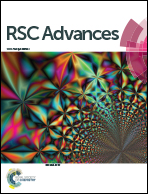Removal of NaCl from saltwater solutions using micro/mesoporous carbon sheets derived from watermelon peel via deionization capacitors†
Abstract
Micro/mesoporous carbon sheets with high specific surface area (up to 2360 m2 g−1) were successfully prepared by using watermelon peel as a carbon source through a simple activation method and were originally developed as highly efficient electrodes for flow-through deionization capacitors to remove NaCl from saltwater solutions. The carbon source is low-cost and the approach is very simple, effective and environmentally-friendly. Owing to the micro/mesoporous structure and high specific area, the obtained electrode presents a superior wettability and good electrochemical performance. In the deionization experiments, the electrodes show a high deionization capacity of 17.38 mg g−1 at 1.2 V in a 500 mg L−1 NaCl solution. Besides, the electrodes possess a high deionization rate at 0.8–1.4 V in 100–500 mg L−1 NaCl solutions. The electrodes also present a good regeneration behavior. The good performance makes the electrodes promising candidates for flow-through deionization capacitors. We also hope that the micro/mesoporous carbon sheets can be applied to other areas.



 Please wait while we load your content...
Please wait while we load your content...